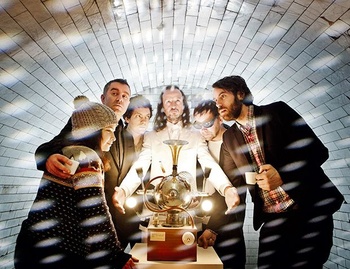At the start of the century, London was the capital of both the United Kingdom and a newly emerging genre: folktronica. Emblematic figures of this kind of folk embroidered on electronic silk, Tunng have, over time, left the movement behind them as they took their own course.
Once a duo, now a group with a varying line-up, these days they can be found either in Iceland or in the English countryside. On their fifth album, Tunng short-circuit the electronic equipment of their early days and concentrate on organic material. Turbines operates at full capacity, turning out a collection of sunny melodies.
When you started off, there were two of you. How did the group develop?
Mike Lindsay: In 2004, it was just Sam Genders and me. At the time, we didn’t expect that people would like our music. We did it locally, for our own enjoyment. But it worked. A label suggested bringing out an album and others followed. We set up a group in order to go on tour. But Sam didn’t like that. He was looking for a certain level of stability. After the third album, he left the group; later, he came back. That coming and going caused quite a lot of confusion. People have the idea in their heads that Tunng has been through countless line-up changes. In reality, it was just Sam who left…several times. Now, there are six of us.
Just before Tunng’s comeback, you brought out a solo album entitled Cheek Mountain Thief. Why the parallel project?
Lindsay: Nothing was premeditated. I met a girl in Iceland. After our tour, at the end of 2011, I went back there to see her. I had composed a few more personal things. As Tunng takes a more collective approach these days, I didn’t try to impose my songs. In Iceland, I felt it was the right time to record that material and to bring it out on an EP. In life, however, you can never be sure of anything… The EP turned into an album. I fell in love with the girl; I got married and we bought a house.
Tunng keep the turbines running

How do you cope with the distance between London and Reykjavík?
Lindsay: We developed a new way of working. We could have settled for exchanging files by e-mail, but we didn’t like that. So we met up in the English countryside; we hired a house and we made progress on our songs. While some people were cooking, others were writing lyrics or recording guitar parts. It was really cool.
The music press has often linked Tunng with the folktronica movement. What do you think?
Lindsay: When the first album came out, the media coined that term. For our part, we were outside all that. We were just happy to record the music that appealed to us. We liked electronica and minimalist beats. Alongside that, we listened to a lot of folk: artists like Bert Jansch, John Fahey, and Davy Graham. The meeting of those two worlds led to the word folktronica. Today, that label seems obsolete to me: it belongs to a particular context, a particular moment in history. Our music has developed and it is difficult to identify other groups belonging to that movement.
Lindsay: We developed a new way of working. We could have settled for exchanging files by e-mail, but we didn’t like that. So we met up in the English countryside; we hired a house and we made progress on our songs. While some people were cooking, others were writing lyrics or recording guitar parts. It was really cool.
The music press has often linked Tunng with the folktronica movement. What do you think?
Lindsay: When the first album came out, the media coined that term. For our part, we were outside all that. We were just happy to record the music that appealed to us. We liked electronica and minimalist beats. Alongside that, we listened to a lot of folk: artists like Bert Jansch, John Fahey, and Davy Graham. The meeting of those two worlds led to the word folktronica. Today, that label seems obsolete to me: it belongs to a particular context, a particular moment in history. Our music has developed and it is difficult to identify other groups belonging to that movement.
The new album is called Turbines. Can you explain that title?
Lindsay: When you have finished recording an album, you try to give it a meaning. When we compared our ideas, we realised that the songs could be linked to the stories of different people, separated by context and distance. Their lives and relationships develop through encounters and interactions with other human beings. In a sense, it’s the circle of life. Turbines relates to that machinery of life: an uncontrollable mechanism.
Tunng • 6/10, 19.30, €13/16, Botanique, Koningsstraat 236 rue Royale, Sint-Joost-ten-Node/Saint-Josse-ten-Noode, 02-218.37.32, www.botanique.be
Read more about: Muziek
Fijn dat je wil reageren. Wie reageert, gaat akkoord met onze huisregels. Hoe reageren via Disqus? Een woordje uitleg.